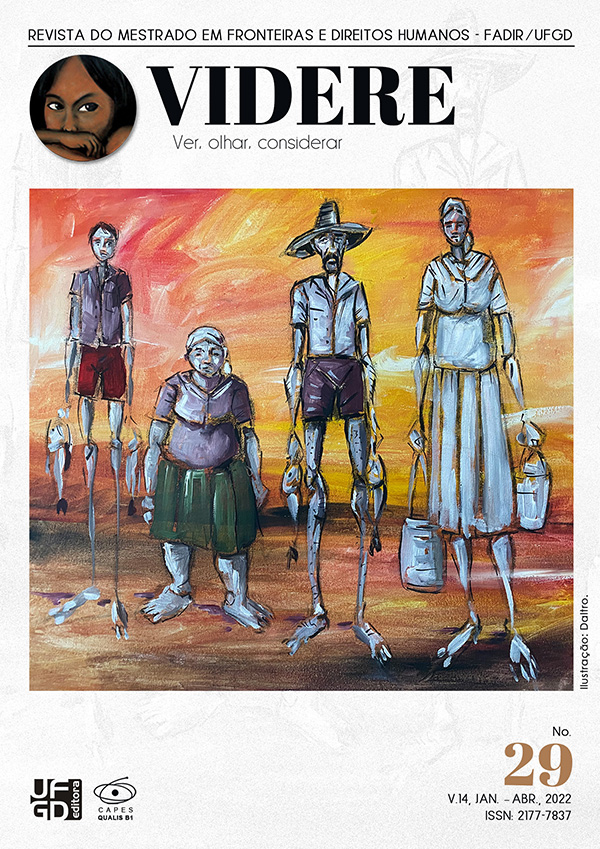The right to development at the international level: material meanings and normative force
DOI:
https://doi.org/10.30612/videre.v14i19.14423Keywords:
desenvolvimento, direito ao desenvolvimento, conteúdo material, efetividadeAbstract
Considering the paradigm shift within the phenomenon of development, with the emergence of new perspectives, such as the idea of the right to development, the general purpose of this article is to analyze, more precisely, the availability of the right to development at an international level, seeking to understand, at first, its main material meanings, as well as to analyze and discuss its normative force at the international legal level, which is a highly controversial topic. The apprehension of the meanings of the right to development is extremely relevant, as it aims at filling out its content and enabling the exploration of its reach. This task is only possible through the analysis of the normative level, in this case represented by the sources of international law. Based on a documental and bibliographical research, the contribution offers a path for the understanding of development, so that it doesn’t become mere political rhetoric, resorting, for this purpose, to the fundamental role of Law.
Downloads
References
ANJOS FILHO, Robério Nunes dos. Direito ao desenvolvimento. São Paulo: Saraiva, 2013.
ANJOS FILHO, Robério Nunes dos. Fontes do direito ao desenvolvimento no plano internacional. In: PIOVESAN, Flávia; SOARES, Inês Virgínia Prado (Coord.). Direito ao desenvolvimento. Belo Horizonte: Fórum, 2010.
BONAVIDES, Paulo. Curso de direito constitucional. 31. ed. São Paulo: Malheiros, 2016.
CAMPINHO, Bernardo Brasil. O direito ao desenvolvimento como afirmação dos direitos humanos: delimitação, Sindicabilidade e possibilidades emancipatórias. In: PIOVESAN, Flávia; SOARES, Inês Virgínia Prado (Coord.). Direito ao desenvolvimento. Belo Horizonte: Fórum, 2010.
COMISSÃO AFRICANA DOS DIREITOS HUMANOS E DOS POVOS, 1981.Carta Africana dos Direitos Humanos e dos Direitos dos Povos. Disponível em: http://www.achpr.org/files/instruments/achpr/achpr_instr_charter_por.pdf. Acesso em: 14 jan. 2021.
COMPARATO, Fábio Konder. A afirmação histórica dos direitos humanos. 7. ed. São Paulo: Saraiva, 2010.
COUTINHO, Diogo Rosenthal. Direito, desigualdade e desenvolvimento. São Paulo: Saraiva, 2013.
DWORKIN, Ronald. Levando os direito a sério. Tradução de Nelson Boeira. São Paulo: Martins Fontes, 2002.
FERRAJOLI, Luigi. Derechos y garantias: la ley Del más débil. Madrid: Trotta, 2006.
GABARDO, Emerson. Interesse público e subsidiariedade: o Estado e a sociedade civil para além do bem e do mal. Belo Horizonte: Fórum, 2009.
GOMES, Orlando. Direito e desenvolvimento. Salvador: Publicações Universidade da Bahia, 1961.
LAFER, Celso. Prefácio. In: PIOVESAN, Flávia; SOARES, Inês Virgínia Prado (Coord.). Direito ao desenvolvimento. Belo Horizonte: Fórum, 2010.
ONU, 1986. Declaração sobre o Direito ao Desenvolvimento. Disponível em: https://bit.ly/2STfbym. Acesso em: 22 jan. 2021.
PIOVESAN, Flávia. Direito ao desenvolvimento: desafios contemporâneos. In: PIOVESAN, Flávia; SOARES, Inês Virgínia Prado (Coord.). Direito ao desenvolvimento. Belo Horizonte: Fórum, 2010.
PIOVESAN, Flávia. Direitos humanos e o direito constitucional internacional. 18. ed. São Paulo: Saraiva, 2018.
RISTER, Carla Abrantkoski. Direito ao desenvolvimento: antecedentes, significados e consequências. Rio de Janeiro: Renovar, 2007.
SOARES, Inês Virgínia Prado. Direito ao desenvolvimento e justiça de transição: conexões e alguns dilemas. In: PIOVESAN, Flávia; SOARES, Inês Virgínia Prado (Coord.). Direito ao desenvolvimento. Belo Horizonte: Fórum, 2010.
SOUSA, Livia Maria de. O direito humano ao desenvolvimento como mecanismo de redução da pobreza em região com excepcional patrimônio cultural. In: PIOVESAN, Flávia; SOARES, Inês Virgínia Prado (Coord.). Direito ao desenvolvimento. Belo Horizonte: Fórum, 2010.
Downloads
Published
How to Cite
Issue
Section
License
Copyright (c) 2022 Revista Videre

This work is licensed under a Creative Commons Attribution-NonCommercial-ShareAlike 3.0 Unported License.
Authors must accept the publication rules when submitting the journal, as well as agree to the following terms:
(a) The Editorial Board reserves the right to make changes to the Portuguese language in the originals to maintain the cultured standard of the language, while respecting the style of the authors.
(b) Authors retain the copyright and grant the journal the right to first publication, with the work simultaneously licensed under the Attribution-NonCommercial-ShareAlike 3.0 Brazil (CC BY-NC-SA 3.0 BR) that allows: Share - copy and redistribute the material in any medium or format and Adapt - remix, transform, and create from the material. CC BY-NC-SA 3.0 BR considers the following terms:
- Attribution - You must give the appropriate credit, provide a link to the license and indicate whether changes have been made. You must do so under any reasonable circumstances, but in no way that would suggest that the licensor supports you or your use.
- NonCommercial - You may not use the material for commercial purposes.
- Sharing - If you remix, transform, or create from material, you must distribute your contributions under the same license as the original.
- No additional restrictions - You may not apply legal terms or technological measures that legally restrict others from doing anything that the license permits.
(c) After publication, authors are allowed and encouraged to publish and distribute their work online - in institutional repositories, personal page, social network or other scientific dissemination sites, as long as the publication is not for commercial purposes.



















